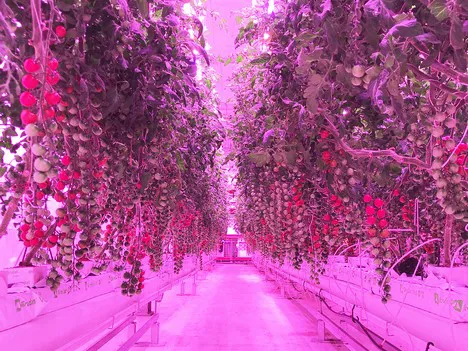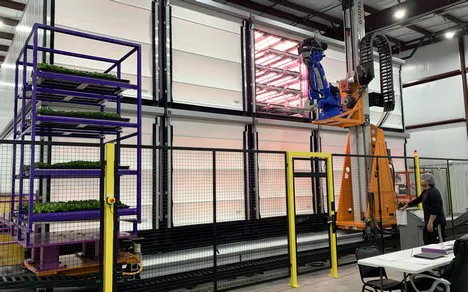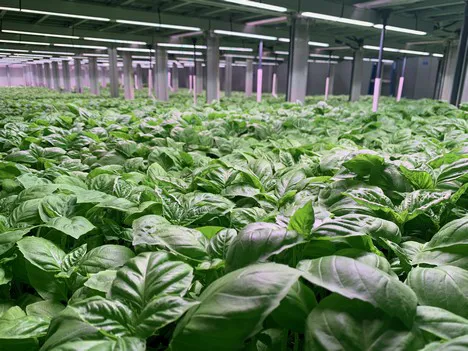Is fully automated farming the future?
It is, in fact, part of the future says Mike Zelkind, chief executive officer of 80 Acres Farms, a vertical farming company based in Hamilton, Ohio. “I think indoor farming should play a role in a holistic solution to farming—so should greenhouses and other traditional farms,” says Zelkind.

The almost five-year-old company is currently working on its third farm in Hamilton, Ohio alone which adds to the family of farms located in Cincinnati, Alabama, Arkansas and North Carolina. It also relies on the indoor farming technology developed by Infinite Acres, its partner company headed up by Zelkind’s business partner Tisha Livingston. (The indoor farming technology is also available for sale outside of 80 Acres.)
Micromanaged product
So what’s inside an 80 Acres farm? The company grows a variety of products including tomatoes, cucumbers, leafy greens and more year-round inside increasingly automated facilities. “Our early farms were more manual. We’re testing different things in different farms—sometimes it’s water, sometimes it’s air flow, other farms you’re testing lighting recipes. But our latest farms are about 80 percent automated,” says Zelkind.

But the automation involved isn’t just for the sake of incorporating automation. “With any normal farm, labor is a big deal so that’s where our philosophy in automation comes in. Along with a lot of backbreaking work in farming, there are also practical production inefficiencies associated with manual seeding, transplanting and harvesting, etc. Without consistency in those processes, you’re never going to grow great crops,” says Zelkind. “So we automate to take care of those things. The product is always tasty and of highest quality because the variability is out of it.”
Which is why the testing throughout each new farm is so key. All of that testing goes towards growing premium product that Zelkind says is high quality in taste, nutrition and more. The products are pesticide and residue free, rely on 100 percent renewable energy to grow as well as use 97 percent less water to produce more food than would grow on a traditional farm its size.
Where they’re located
But 80 Acres is also about location, location, location. “We focus on building our farms next to distribution centers so we essentially eliminate the supply chain,” he says. Not only does it cut down on supply chain issues but it adds to the product’s quality says Zelkind. “We don’t have as many people touching the food. It’s a clean, food-safe environment to grow food and quickly and safely distribute it. And the food is always fresher because it’s 1-2 days old and it’s harvested for orders,” he says, noting that its farms are generally pre-sold in product before building.

So, why isn’t everyone farming this way? “Indoor farming is just one critical component of solving the world’s food supply issues. It’s capital intensive and it’s really challenging. The industry is still young and learning,” says Zelkind. That said, he adds that capital and operating costs have come down significantly since 80 Acres began operating five years ago, and the farms are energy efficient.
To truly impact the produce industry with this new farming technique, not only must one grow differently, but you need to find a better way to communicate the product’s benefits to a customer through effective merchandising, says Zelkind. “You have to collaborate with retail partners to communicate with their customers. Consumers are asking for food with more nutrition, better taste and other locally grown benefits,” he says, adding that 80 Acres product is priced at organic levels. “With volume, we might be able to go below organic pricing. But this is everything organic is aspiring to be.”
At the end of the day, Zelkind notes that it’s still just farming at 80 Acres. “Food doesn’t grow itself no matter how many vision systems you put around it,” says Zelkind.
For more information:
Rebecca Haders
80 Acres Farms
Tel: +1 (513) 910-9089
rebecca.haders@eafarms.com
https://www.80acresfarms.com/
